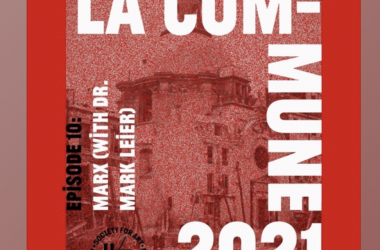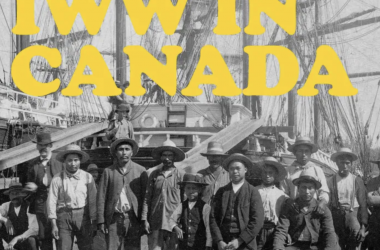By Mark Leier
Originally posted on Activehistory.ca
September 9th, 2016

Karl Marx consulting the so-called “Fathers of Confederation”
Deep in the archives of the Society for the History of Anarchism and Marxism, (SHAM) I discovered a hitherto unknown letter from Karl Marx to Friedrich Engels. Dated 21 July 1867, the bulk of the letter is a reaction to the confederation of Canada, which had been proclaimed twenty days earlier. It is particularly interesting for two reasons. First, Marx paid scarce attention to Canada in his work. There are only three references to the country in Capital, and these are incidental; there are nearly as many references to oral sex.[1]
Second, throughout the letter, the events in Canada are cast explicitly in the light of his own work, especially The Communist Manifesto, written with Engels in 1848, and Capital, which Marx was preparing for the publisher at the time of this letter. Thus we see Marx applying his method of historical investigation in a concrete case.
Unless otherwise noted, Marx’s quotations are from the Manifesto. Where other work is drawn upon, I have added citations and explanatory material in footnotes.
Karl Marx to Friedrich Engels, 21 July 1867, London, England
Dear Freddie,
Many thanks for the fiver enclosed in your last. It will let Jenny redeem the family silver from the pawnbroker and pay off that amiable idiot Dr. Croaker, who has recommended yet another worthless but expensive salve for the boils that plague me. [2] I hope our political work will give the bourgeoisie cause to remember my carbuncles until their dying day!
I see in the Times that the colonies of British North America have confederated into a new country. The bourgeoisie of Britain will rejoice to see their investments in the watered railway stock of the provinces consolidated and guaranteed by the power of the state to tax its new citizens. Huzzah! Hang out the bunting!
It is all proof, as we noted so many years ago, that “the more the original isolation of the separate nationalities is destroyed by the developed mode of production and intercourse and the division of labour between various nations naturally brought forth by these, the more history becomes world history.” Even Canada, Voltaire’s quelques arpents de neige,
is now dragged onto the world stage. But it is hardly a world-historical event as in “the case of sugar and coffee or if a machine in England is invented which deprives countless workers of bread in India and China.”[3]
What is amusing is how these so-called “Fathers of Confederation” have followed precisely the path of historical development we sketched in our Communist Manifesto nearly 20 years ago.
They of course did so without ever bothering to read the Manifesto, even though the indomitable Miss Helen Macfarlane translated it into English in 1850. I confess I have a certain fondness for her translating “Ein Gespenst geht um Europa” as “a hobgoblin stalks through Europe” rather than “a spectre is haunting Europe.” Nonetheless, it is as if these mountebank stockjobbers and their political functionaries took our little pamphlet as a mechanic’s handbook for capitalists, so well did we outline the laws of motion of the capitalist mode of production.
As we said there, so has it unfolded in Canada: “the bourgeoisie has at last, since the establishment of Modern Industry and of the world-market, conquered for itself, in the modern representative State, exclusive political sway.” This new state claims to represent all equally, but of course “the executive of the modern State is but a committee for managing the common affairs of the whole bourgeoisie.”
So what does this Canadian bourgeoisie require from the state it has conquered? As we said: “Political centralization. Independent or but loosely connected provinces, with separate interests, laws, governments and systems of taxation, became lumped together into one nation, with one government, one code of laws, one national class interest, one frontier, and one customs-tariff.”
This centralization will of course give the capitalists the organized state power they require to expand across the entire territory of British North America. We will doubtless see in Canada the same process of primitive accumulation we have seen wherever the capitalist mode of production asserts itself: “Conquest, enslavement, robbery, murder, in short, force, play the greatest part….in America, the extirpation, enslavement, and entombment in mines of the indigenous population, the…conquest and plunder of India, and the conversion of Africa into a preserve for the commercial hunting of black skins, are all things which characterize the dawn of the era of capitalist production…. This history, the history of their expropriation, is written in the annals of mankind in letters of blood and fire.”[4]
The self-styled “Fathers of Confederation”—presumably the “mother” is Queen Victoria, proving our assertion that “the bourgeois sees in his wife a mere instrument of production” and so “bourgeois marriage is in reality a system of wives in common”—are no doubt content to tell each other that they have been impelled to devise a new state solely by their love of democracy and patriotic sentiment. Pah! Empty phrases that conceal their real intent, from themselves and their chroniclers! How did we put it? “Whilst in ordinary life every shopkeeper is very well able to distinguish between what somebody professes to be and what he really is, our historians have not yet won even this trivial insight. They take every epoch at its word and believe that everything it says and imagines about itself is true.”[5]
So too have these politicians deluded themselves, or, more to the point, simply proved once again that “the ideas of the ruling class are in every epoch the ruling ideas, i.e. the class which is the ruling material force of society, is at the same time its ruling intellectual force. The ruling ideas are nothing more than the ideal expression of the dominant material relationships, the dominant material relationships grasped as ideas.”[6]
What then does the new state represent? Merely that the fetters of feudalism were “burst asunder [and] into their place stepped free competition accompanied by a social and political constitution adapted to it and by the economical and political sway of the bourgeois class.”
For Canada, the reality behind the mask of parliament is that “modern industry has converted the little workshop of the patriarchal master into the great factory of the industrial capitalist.” Now everyone is to be pressed into the service of capital, for all are “transformed into simple articles of commerce and instruments of labour.” Capital has “converted the physician, the lawyer, the priest, the poet, the man of science, into its wage labourers.” Of course, “owing to the extensive use of machinery and the division of labour, the work of the proletarians has lost all individual character and, consequently, all charm for the workers. They become an appendage of the machine. In proportion as the repulsiveness of the work increases, the wage decreases. Differences of age and sex have no longer any distinctive social validity for the working class. All are instruments of labour, more or less expensive to use, according to their age and sex.”
Such will be the fate of Canadian workers: “the modern labourer, instead of rising with the progress of industry, sinks deeper and deeper below the conditions of existence.” The very land itself will likewise follow the path established by capital elsewhere. Spurred by competition, Canadian capital, like capital everywhere, will hardly realize that “an entire society, a nation, or all simultaneously existing societies taken together, are not the owners of the earth. They are simply its possessors, its beneficiaries, and have to bequeath it in an improved state to succeeding generations.”[7]
Instead, Canada will see, as our Manifesto put it, the ongoing “subjection of Nature’s forces to man, machinery, application of chemistry to industry and agriculture, steam-navigation, railways, electric telegraphs, clearing of whole continents for cultivation, canalization of rivers, whole populations conjured out of the ground….”
Time will tell how quickly these Canadian workers will learn the lessons they need to learn. For all their fine new democracy, the workers of Canada—male white workers, that is—have only “the right to decide once in three or six years which member of the ruling class will misrepresent the people in Parliament.” Say, that’s not half bad! I may be able to use that somewhere else.[8]
But just as capital develops, so too does the proletariat and its struggles. From a “contest carried on by individual labourers, then by the workpeople of a factory, then by the operatives of one trade, the proletariat not only increases in number; it becomes concentrated in greater masses, its strength grows, and it feels that strength more.”
Perhaps the Canadians will build on the lessons of British workers and win a shorter working day. As I have recently noted, “One nation can and should learn from others so it can shorten and lessen the birth-pangs.”[9] Of course, “the real fruit of their battles lies, not in the immediate result, but in the ever expanding union of the workers.” Then they may “raise the proletariat to the position of ruling class…. and wrest by degrees all capital from the bourgeoisie…. so we shall have an association in which the free development of each is the condition for the free development of all.” I admit, this has taken longer than we predicted. Ah, youth!
For me, I am less concerned with the birth of Canada than I am with another blessed event: finally, the corrected proofs of Das Kapital are nearly ready to be sent to the publisher. We’ll see which will have the greatest impact on the world.[10] Though I will confess to you, dear friend, I suspect the royalties for this book will not pay for the cigars I smoked during the writing.[11]
Jenny sends her love. Send money when you can, the sooner the better.
As always, your friend and comrade,
Karl
When he is not channeling 19th socialists, Mark Leier teaches history at Simon Fraser University. He is the author of Bakunin: The Creative Passion, and four books on Canadian labour history, most recently, the revised edition of Rebel Life: The Life and Times of Robert Raglan Gosden, Revolutionary, Mystic, and Labour Spy, published by New Star Books. He is currently at work on a history of Canada for activists.
Notes
[1] See Capital, Chapter 27, “The Expropriation of the Agricultural Population from the Land,” footnote 12.
[2] Jenny von Westphalen and Karl Marx were married in 1843. She died, age 67, in 1881. Marx died in 1883, age 64. Marx’s boils have intrigued historians for decades. See, for example, Sam Shuster, “The nature and consequence of Karl Marx’s skin disease,” British Journal of Dermatology, Volume 158, Issue 1, January 2008, pp. 1-3.
[3] These quotes are from Marx and Engels, The German Ideology, written in 1846 but unpublished in their lifetimes.
[4] This is taken from Marx, Capital, Part 8, “So-called Primitive Accumulation.” Marx uses the term to describe how This is the process by which the capitalist class expropriates for its sole use the land possessed by other peoples and thus makes it impossible for them to continue their way of life outside of capitalist class relations. Marx has been badly served here by his translators. While the phrase is usually translated into English as “primitive accumulation,” he used the German “ursprünglich,” meaning “original” or “initial” accumulation. The quotations above come from Chapter 26, “The Secret of Primitive Accumulation,” and Chapter 31, “The Genesis of the Industrial Capitalist.”
[5] Marx and Engels, The German Ideology.
[6] Marx and Engels, The German Ideology. They express this also in The Communist Manifesto, writing, “The ruling ideas of each age have ever been the ideas of its ruling class.”
[7] This appears in Capital, Volume III. Unpublished in Marx’s lifetime, he was drafting this volume in 1867.
[8] This quotation is taken from The Civil War in France, published in 1871.
[9] See the preface to the first German edition of Capital.
[10] In 1986, The New Republic held a contest asking readers to suggest a headline more boring than “Worthwhile Canadian Initiative.” According to a 2015 poll, 28% of Canadians cannot identify John A. Macdonald as Canada’s first prime minister. In 2005, 28.9% of Britons polled chose Marx as the greatest philosopher of all time, taking first place over Socrates, Plato Kant, Hume, and Aristotle.
[11] Marx was a heavy smoker and Das Kapital: Kritik der politischen Oekonomie, published in German in September 1867, sold only 1,000 copies over five years. A French edition was published as a serial in 1872, and the first English edition was published in 1887, three years after Marx’s death. However, the first Russian edition, 1872, sold 3,000 copies in a single year. Today, the average print run for an academic book published by an American university press is about 600 copies.





